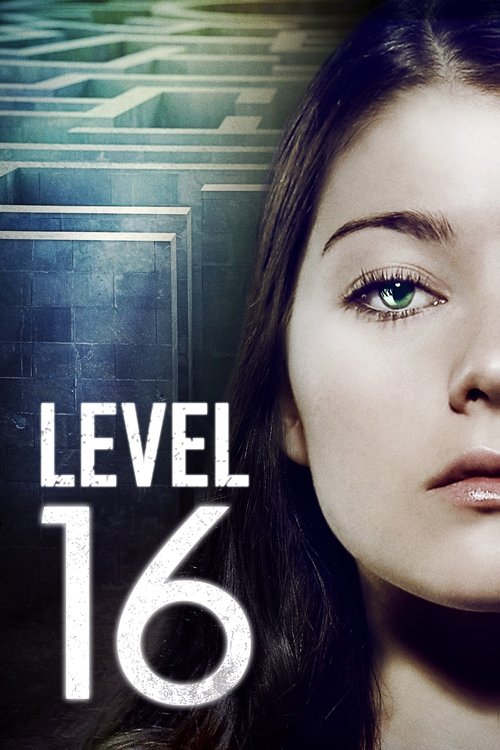Level 16 – Film Review
Published May 11, 2025

Level 16 is a Canadian dystopian sci-fi thriller from writer-director Danishka Esterhazy. Released in 2018, it presents a haunting vision of institutional control, gendered obedience, and the commodification of femininity. Though modest in budget, the film thrives on atmosphere, intriguing ideas, and committed performances, particularly from its young leads. Yet, its promise is hampered by narrative flatness and underdeveloped themes, making for a compelling but ultimately limited experience.
The story takes place in the Vestalis Academy, an all-girls boarding school-like facility where a group of teenage girls is raised under the strictest codes of behavior. The institution drills “feminine virtues” into them—obedience, cleanliness, patience, humility—and penalizes any deviation. Every moment of their lives is scheduled and surveilled. The girls wear identical grey uniforms, never see daylight, and take daily supplements to keep them “healthy.” Any form of individuality is forbidden. When one of the girls, Vivien (Katie Douglas), reaches the titular Level 16, her final year before graduation and adoption, she begins to see cracks in the narrative she’s been taught all her life.
The film’s setup is smart and sinister, evoking a hybrid of The Handmaid’s Tale, Orphan Black, and Never Let Me Go, though it’s more contained and deliberately paced. The academy’s sterile hallways, harsh lighting, and brutal routine evoke a psychological prison. Vivien is the perfect product of her upbringing—disciplined, emotionally guarded, and compliant—until her estranged childhood friend Sophia (Celina Martin) begins poking holes in the facade. The truth they uncover is horrific, but the journey there is a slow, creeping burn.
Katie Douglas gives a standout performance as Vivien. She masterfully captures the inner conflict of a girl raised to repress all instincts of rebellion, who begins to realize her survival may depend on embracing her anger and curiosity. Her guardedness isn’t just a personality trait—it’s a survival mechanism, and Douglas’ performance makes the audience feel the weight of every decision Vivien makes. Celina Martin is equally solid as Sophia, offering a more visibly anxious and conspiratorial counterpart, helping to peel back the mystery. Their friendship, rocky and built on a shared trauma, is the emotional anchor of the film.
Esterhazy directs with precision. The production design, despite clear budgetary constraints, is impressively cohesive. The setting—almost entirely within the academy—feels simultaneously clinical and claustrophobic. Pale blue lighting and rigid framing reinforce the oppressive atmosphere. The cinematography by Michael Marshall is intimate and unsettling, leaning on tight shots that make the viewer feel as trapped as the girls.
What Level 16 does particularly well is build unease through routine. Unlike many dystopian films that lean heavily on exposition or shock, this one simmers. The audience spends time watching the girls go through their monotonous, ritualistic grooming, waiting in blank hallways, scrubbing their faces and hands obsessively. It’s a masterclass in restraint, allowing tension to mount organically as small deviations—like a dropped vitamin pill or a whisper in the dark—take on life-or-death consequences.
However, Level 16 falters when it comes to fully exploring the implications of its premise. The film makes a dramatic pivot in its third act, when the mystery of the academy is unveiled. Without spoiling the central twist, the reveal leans on body horror and moral outrage, suggesting a commentary on the exploitation of young women, human trafficking, and capitalist vanity. Yet, the film doesn’t dig deeply enough into these ideas. The concept is horrifying, but the script seems unsure whether it wants to be a genre horror story, a feminist allegory, or a straightforward thriller. As a result, it touches on many important themes—purity culture, bodily autonomy, commodification—but doesn’t fully interrogate any of them.
The supporting characters are mostly one-note. Sara Canning plays Miss Brixil, the icy instructor who enforces the school’s rules with robotic detachment. She’s effectively creepy but lacks dimension; we’re never allowed to see if she believes in the system or is just another cog. Similarly, Peter Outerbridge plays Dr. Miro, a seemingly benevolent figure who gradually reveals a darker purpose. His arc is predictable and underwhelming. While both actors do what they can with the material, their characters are underwritten and symbolic rather than human.
The pacing, particularly in the second act, is uneven. Once the central mystery begins to unravel, there’s a stretch where the film spins its wheels, repeating moments of suspicion and incremental defiance without much escalation. While the deliberate pacing works early on, building atmosphere and tension, it begins to feel like narrative padding as the story moves toward its conclusion.
Still, the final act, though rushed, delivers a satisfying enough resolution. There’s a brief but effective eruption of violence and rebellion, which brings some catharsis, though one wishes the ending had a little more bite or thematic closure. The final moments offer a glimmer of hope but also ambiguity, which feels appropriate for a story about reclaiming agency after lifelong manipulation.
In terms of genre, Level 16 exists in a liminal space. It’s not quite a horror film, though its premise and aesthetics flirt with body horror and psychological dread. It’s not purely a thriller, as the tension is more atmospheric than action-driven. And it’s not fully a sci-fi film, despite taking place in a speculative setting. Instead, it’s a mood piece with thriller elements, grounded in allegory more than spectacle.
From a feminist perspective, the film’s critique of patriarchal control and the idealization of femininity is timely and potent. The academy’s obsession with purity, beauty, and subservience is a literal and metaphorical critique of societal expectations placed on women. That said, the film is perhaps too subtle for its own good at times—many of these themes are inferred rather than directly confronted, which can blunt the impact for some viewers.
Ultimately, Level 16 is a thoughtful, unsettling sci-fi thriller that overachieves within its modest production framework but underdelivers on its provocative ideas. The performances, particularly by Douglas and Martin, are strong and nuanced, and Esterhazy’s direction is stylish and assured. But the script could have benefitted from a deeper engagement with the themes it flirts with, and a more dynamic midsection.
For fans of slow-burn dystopias and female-centered genre films, Level 16 is worth the watch. It doesn’t reinvent the wheel, but it carves out its own corner in the genre with chilling conviction and a cold, quiet rage.
